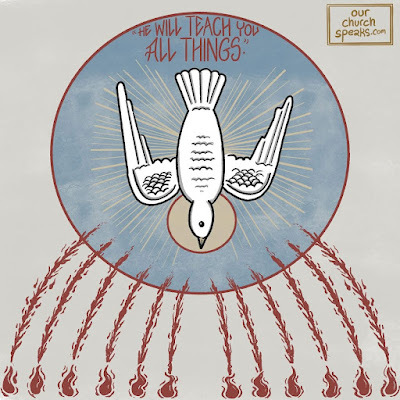Pentecost

June 8, 2025
Acts 2.1-21
+ This past week Deacon Suzanne and I met to discuss a few things,and our conversation turned to theology.
We discussed some interesting things regarding the nature of God,the Trinity.
And the Holy Spirit.
It’s interesting to talk to someone else about these things,because it helps put a needed perspective on one’s own views and beliefs.
The Holy Spirit does not usually get a whole lot of conversation.
But today, it’s all about the Holy Spirit.
As it should.
Yes, we are of course celebrating Pentecost today.
It’s a very important day in the life of the Church.
Today is essentially the “birthday” of the Church.
But, in Judaism, the feast of Shavuot was just celebrated lastweek.
Shavuot is a wonderful and important Jewish feast.
It is now 50 days since Passover.
The word Shavuot is Hebrew for “weeks.”
The belief is that, after fifty days of traveling after leavingEgypt, the nation of Israel now has finally arrived at Mount Sinai.
And on Shavuot, the Torah, the “Law,” the 10 Commandments weredelivered to them by Moses.
So, in a very real sense, this is an important day not just forJudaism, but for us as well.
The Torah, the 10 Commandments, are important to us too.
Our feast of Pentecost is very similar in many ways.
It now 50 days after Easter.
The word “Pentecost” refers to the Greek word for 50.
And it’s connection with Shavuot is pretty clear.
Shavuot is this feast onwhich the early Jews offered to God the first fruits of their harvests.
And that is particularly meaningful to us Christians and what wecelebrate on this day of Pentecost.
It is meaningful that the Holy Spirit came among us on the feast ofShavuot in which the first fruits were offered to God.
After all, those first Christians who gathered in that upper roomin our reading this morning from Acts, were truly the first fruits of theChurch.
And let’s not forget that those first Christians were also Jews,gathering to celebrate the festival of Shavuot.
God chose to send the Spirit on those first followers of Jesus onjust the right day.
Still, like nuclear power or electricity, God’s Spirit issometimes a hard thing for us to grasp and understand.
The Spirit can be elusive and strange and sometimes we might havea hard time wrapping our minds around the Spirit.
In a sense what happens with the Descent of God’s Spiritupon us is the fact that we now have the potential to be prophets ourselves.
The same Spirit which spoke to Ezekiel in our reading this morning,which spoke to Isaiah, which spoke to Jeremiah, which spoke to Moses, whichspoke through Jesus, also can now speak to us and be revealed to us just as itspoke and was revealed to those prophets from the Hebrew scriptures and throughJesus.
That is who the Spirit is in our midst.
The Spirit we celebrate today—and hopefully every day—and in ourlives is truly the spirit of the God that came to us and continues to be withus.
It is through this Spirit that we come to know God in ways wemight never have before.
God’s Spirit comes to us wherever we may be in our lives—in anysituation or frustration.
God’s Spirit is with us, as Jesus promised, always.
Always.
For those of us who want to grasp these experiences—who want tohave proof of them—the Spirit doesn’t fit well into the plan.
We can’t grasp the Spirit.
We can’t make the Spirit do what we want it to do.
In that way, the Spirit truly is like the Wind that came rushingupon those first disciples.
So, how do we know how the Spirit is working in our lives?
Well, as Jesus said, we know the tree by its fruit.
In our case, we know the Spirit best through the fruits God’sSpirit gives us.
Remember what the feast of Pentecost originally was?
It was the Jewish feast on which the first fruits were offered toGod.
On the feast of Pentecost, we celebrate the fruits the Spirit ofGod gives to us and we can be thankful for them, and, most importantly, sharethem in turn with those around us.
The Spirit comes to us and manifests itself to us in the fruitsgiven to us by the Spirit.
We often hear about Pentecostals—those Christians who have beenborn (or baptized) in the Spirit.
They are the ones who speak in tongues and prophesy and have wordsof knowledge or raise their hands in joyful praise—all those things we goodEpiscopalians find a bit disconcerting.
These Pentecostals—as strange as we might find thesepractices—really do have a lot to teach the rest of us Christians about theworkings of the Holy Spirit in our lives.
I remember the first time I ever attended a Pentecostal church.
Rather than being attracted to that way of worship, I was actuallyturned off.
Partly my reason for doing so, is that by that time in my life Ihad, in fact experienced the Spirit very profoundly in my life.
For me, the Spirit of God came to me not in a noisy, raucous way,but rather in a quiet, though just as intense, way.
The Sprit of God as I have experienced it has never been a“raining down” so to speak, but rather a “welling up from within.”
The fruits of the Spirit for me have been things such as anoverwhelming joy in my life.
When the Spirit is near, I feel clear-headed and, to put itsimply, I simply feel happy.
Or, in the midst of what seems like an unbreakable dark grief,there is suddenly a real and potent sense of hope and light.
When the future seems bleak and ugly, the Spirit can come in andmake everything worth living again.
We experience God’s Spirit whenever we feel joy or hope.
As Jesus says in today’s Gospel, the Spirit of God is a Spirit ofTruth.
We experience God’s Spirit when we strive for truth in this world,when truth comes to us.
In turn, we are far from God’s Spirit when we let bitterness andanger and frustration lead the way.
We frustrate God’s Spirit when we grumble and mumble about eachother and hinder the ministries of others in our church, when we let our ownagendas win out over those who are trying also to do something to increaseGod’s Kingdom in our midst.
We deny the Spirit when we deceive ourselves and the truth is notin us.
No doubt everyone here this morning has felt God’s Spirit in someway, although we might not have readily recognized that experience as God’sSpirit.
But our job, as Christians, is to allow those fruits of the Spiritto flourish and grow.
For us, we let the Spirit of God flourish when we continue tostrive for truth and justice, when stand up against the dark forces of thisworld.
The Spirit of God compels us again and again to stand up and to bedefiant against the dark forces of this world!
That dynamic and life-giving presence of the Spirit of God speaksloudly to us.
Certainly we see the Holy Spirit at work in the ministries we do,in the love we share with others, with the truth we proclaim as Christians,even in the face of opposition.
We experience this Spirit of truth when we stand up againstinjustice, wherever it may be.
This is how God’s Spirit comes to us.
The Spirit does not always tear open the ceiling and force its wayinto our lives.
The Spirit rather comes to us just when we need the Spirit to cometo us.
Though, often the Spirit comes to us as fire—an all-consuming firethat burns way all anger and hatred and fear and pettiness and nagging and allthe other negative, dead chaff we carry within us.
So, this week, in the glow of the Pentecost light, in the Shavuotglow with the Law written deep in our hearts, let us look for the gifts of theSpirit in our lives and in those around us.
Let us open ourselves to God’s Spirit and let it flow through uslike a caressing wind and burn through us like a purifying fire.
And let us remember the true message of the Spirit to all of us.
Whenever it seems like God is distant or nonexistent, that is whenGod might possibly be closest of all, dwelling within us, being breathed untous as with those first disciples.
On these feasts of Shavuot and Pentecost—these feasts of thefruits of God—these feasts of the fire of God—let us give thanks forthis God who never leaves us, who never stops loving us, but who comes to usagain and again in mercy and in truth.



